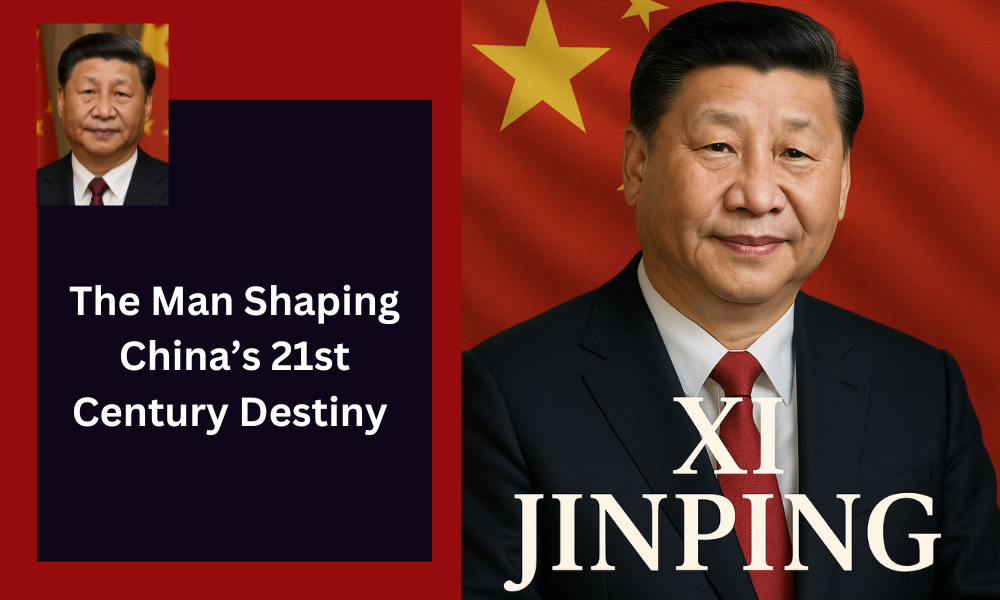Xi Jinping: The Man Shaping China’s 21st Century Destiny
Few names have attracted as much interest, curiosity, and influence on the world chessboard of power as Xi Jinping. The future of the most populous country in the world as well as world geopolitics are being shaped by Xi’s leadership as President of the People’s Republic of China and General Secretary of the Chinese Communist Party (CCP).
Xi Jinping was born into a communist family in 1953, therefore he is familiar with the inner workings of China’s political system. Despite being a high-ranking official in the Communist Party, his father, Xi Zhongxun, did not protect Xi from adversity. His father was expelled during the Cultural Revolution, and Xi was taken to the countryside for “re-education.” These early years, which were spent in the isolated town of Liangjiahe, are now frequently mentioned in state media as having given the man who would eventually lead the country perseverance and discipline.
A Rise Through the Ranks
Xi’s ascent to power was quiet and gradual. As he rose through the ranks of the party, he oversaw the provinces of Zhejiang and Fujian before taking over the vibrant city of Shanghai. His profile was raised by his image as someone who was both strong on corruption and practical with economic policy.
Xi Jinping assumed leadership of the CCP in 2012 and was elected President of China in 2013. Bold reforms, a strong concentration of power, and a strategic vision aimed at reclaiming China’s position as a world leader have been hallmarks of his leadership since then.
The Xi Doctrine: A Stronger, More Assertive China
The vast infrastructure and investment project known as the Belt and Road Initiative (BRI), which spans more than 60 nations, has been one of Xi’s most important projects. Xi imagines a contemporary Silk Road that expands China’s economic reach and expands its power through roads, ports, railroads, and trade networks.
Thousands of officials have been the subject of investigations or imprisoned as a result of Xi’s extensive anti-corruption initiatives at home. Many people applaud the drive for purging the party, but others contend it also aims to crush political opponents and strengthen Xi’s hold on power.
China has also adopted a more forceful posture in regional affairs throughout his tenure. Xi’s administration has been outspoken in protecting China’s rights and sovereignty, from the South China Sea to the Taiwan dispute. Global powers, particularly the United States, have been both interested and worried by this hard position.
Power and Permanence
By voting to eliminate term limits for presidents in 2018, China’s National People’s Congress essentially gave Xi the ability to hold office eternally. This action represented a substantial departure from the changes implemented after Mao to avoid one-man rule. Opponents worry about a shift towards authoritarianism, while supporters contend that steady leadership is essential for long-term national objectives.
Additionally, Xi has sought to consolidate the party’s authority over every facet of Chinese society. Under Xi, the CCP has strengthened its hold on everything from media and education to internet firms and culture. Pop culture influencers are now subject to more stringent rules, while tech behemoths like Tencent and Alibaba are coming under more scrutiny. All of this is a component of Xi’s “common prosperity” ideology, which emphasises social harmony above individualism.
The Global Stage and Future Outlook
Xi is in power during a period of significant global change. China under Xi is presenting itself as a steady option as the US reevaluates its place in the world and Europe struggles within its own borders.
Notwithstanding economic obstacles, such as problems in the real estate industry and demographic shifts, Xi is steadfast in his long-term goals. His drive for technological independence, particularly in the areas of AI and semiconductors, demonstrates his resolve to lessen reliance on Western systems.
The relationship with the West is still complicated. Although there are still concerns over topics like cybersecurity, Xinjiang, and Hong Kong, economic connections are still strong. On the international scene, Xi frequently adopts a forceful yet measured stance, opposing foreign meddling while urging collaboration on issues like climate change.
A Leader for the History Books?
China under Xi Jinping is not like China under his predecessors. It is more centralised, more self-assured, and more committed to defining its course. There is no doubting Xi’s influence, regardless of whether one sees him as a divisive strongman or a visionary leader.
He is reshaping China, not simply running it.
The impact of Xi Jinping’s vision for his country will continue to spread across continents as the twenty-first century progresses. The world keeps a close eye on him because the choices he makes in Beijing could determine the course of world history.

vjuosizmrjxopvtitmnjzxkivqihxe